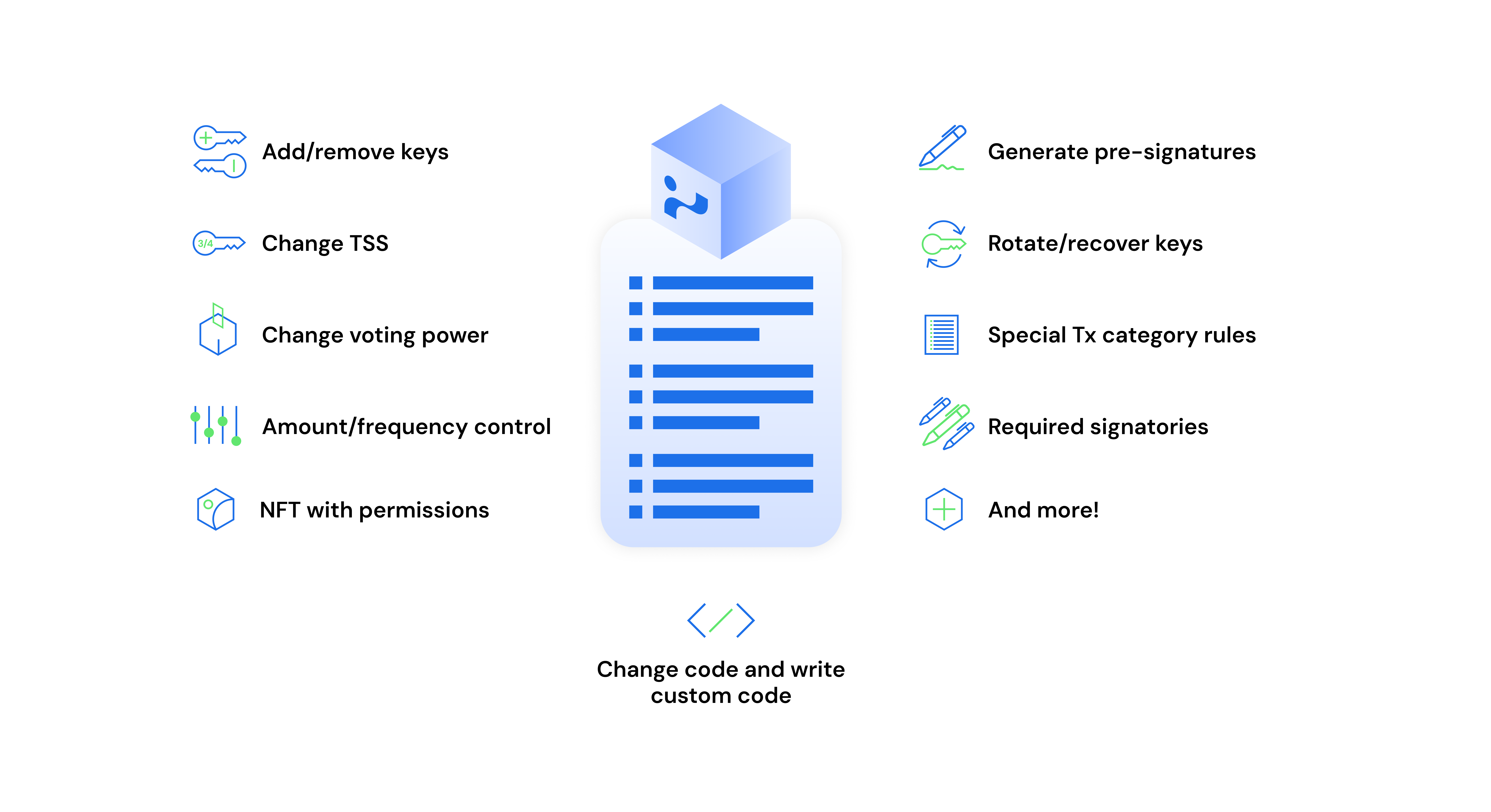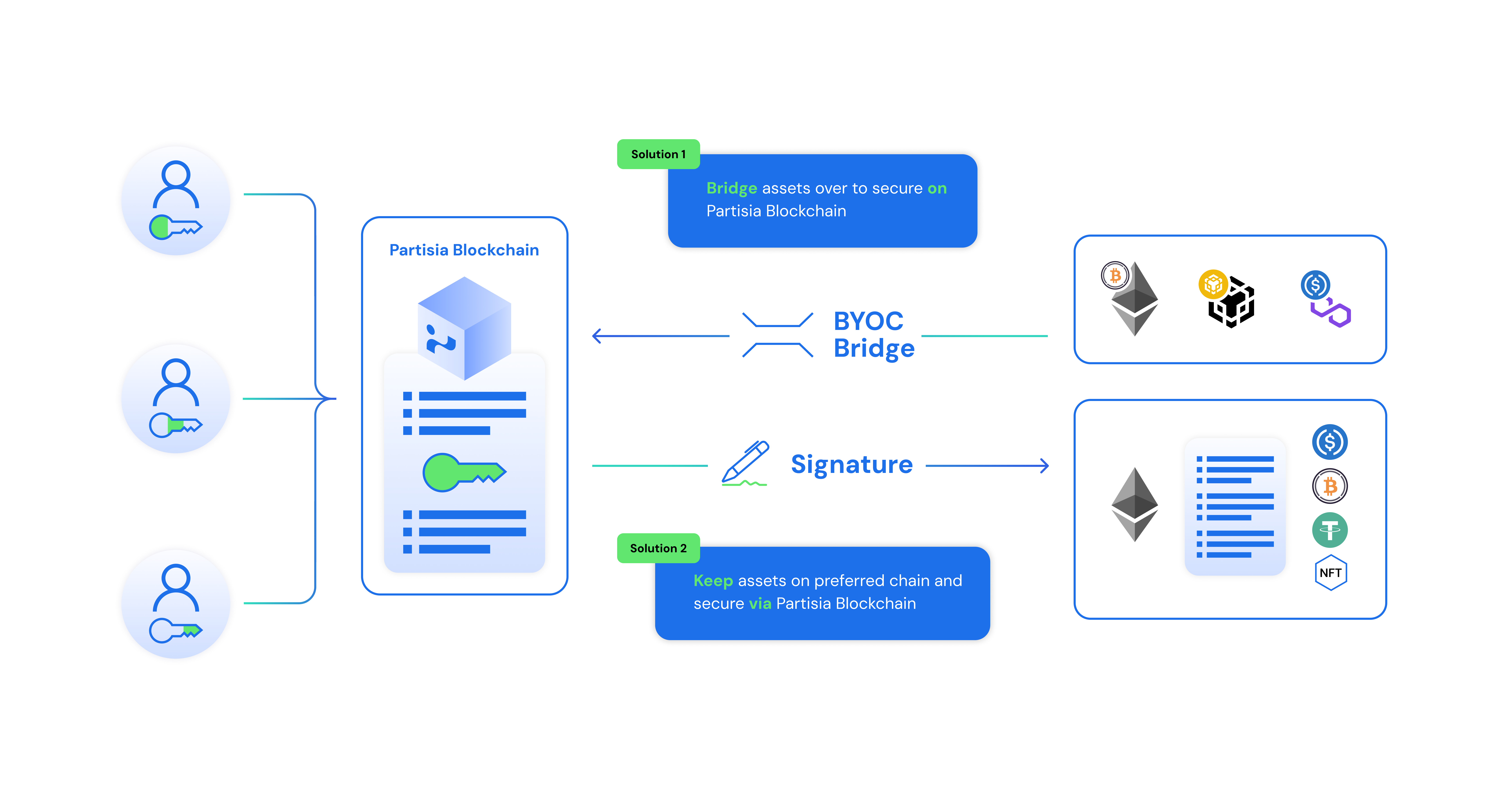For the second consecutive year, Partisia Blockchain took center stage in Davos during the World Economic Forum (WEF), marking a milestone with the largest delegation to date. Despite the cold weather, tight security and a packed agenda, our mission to promote Partisia Blockchain remained unwavering, leading to more than 45 engagements—spanning keynote addresses, panel discussions, industry sessions and speeches over five dynamic days.
A defining moment occurred in Davos with the launch of our MPC On-Chain Custody Advanced (MOCCA) solution. This decentralized, programmable, multichain custody solution set a new industry standard, addressing the pressing need for fortified infrastructure, transparency and expanded usability.
The WEF’s overarching theme, “Rebuilding trust”, framed numerous discussions on blockchain’s pivotal role in restoring trust. Our engagements with decision-makers consistently highlighted blockchain and other innovative technologies as essential tools in the pursuit of regaining trust.
Davos 2024 witnessed an increased focus on the regulatory landscape within the blockchain sphere. Discussions delved into Europe’s MiCA regulation and actions by global supervisory bodies. The consensus underscored the vital role of key infrastructure, exemplified by Partisia Blockchain, in strengthening security, privacy and transparency. This regulatory exploration unfolded amidst a surge of interest in decentralized finance (DeFi) and tokenization.
In DeFi, stakeholders explored its potential to rebuild trust through enhanced reliability. Conversations spanned liquidity, risk management and the disruptive impact on traditional finance, with trustless technology emerging as a viable solution. Tokenization, powered by blockchains like ours, took center stage, showcasing its transformative capacity to simplify securities issuance and provide irrefutable ownership through immutable records.
Trust, a pervasive theme in Davos, seamlessly aligned with Partisia Blockchain’s mission. Insights from Brian Gallagher, our Co-Founder, emphasized the importance of building decentralized trust networks. The regulatory imperative for managing risk across digital asset markets highlighted the collective responsibility required for a resilient and inclusive market environment. Technology’s role in enhancing transparency and mitigating risks showcased blockchain’s potential.
Brian Gallagher emphasized cross-chain liquidity’s necessity, pointing to the vital role of multichain solutions. Discussions on Central Bank Digital Currencies (CBDCs) and stablecoins explored their harmonious coexistence, delving into regulatory nuances, stability and trust. The week culminated with a focus on cybersecurity priorities, positioning blockchain’s collective responsibility as pivotal for a secure digital future.
Identity management as part of trust building was a key conversation in Davos. Shirly Valge, our Chief of Growth, participated in a panel on Web3 and digital identity, highlighting user data control and fraud prevention. The recurring theme of infrastructure underscored blockchain’s foundational role in shaping the evolving Web3 landscape. Security, a constant thread, scrutinized Bitcoin mining, digital identity and the Web3 venture landscape, emphasizing the need for technology to balance scalability, usability, interoperability and digital security.
Beyond engagements, the Partisia Blockchain delegation held fruitful meetings with potential partners, resulting in letters of intent, collaborations and agreements.
In retrospect, Davos 2024 stands as a landmark event, revealing transformative themes that will undoubtedly shape the future of blockchain. From regulatory advancements to technological breakthroughs, the week served as a testament to the industry’s commitment to innovation and trust-building.
Read our daily wraps here: 15 January 2024, 16 January 2024, 17 January 2024, 18 January 2024, 19 January 2024
Stay updated: Website • X • Discord • Telegram • LinkedIn • Facebook • Instagram • GitLab • Medium • YouTube
Welcome to our rundown of the final day at Davos! We have had a packed schedule this week during the World Economic Forum (WEF). Over the last four days we have attended more than 45 sessions and events, launched our very own MOCCA (MPC On-Chain Custody Advanced) solution at a keynote address, and participated in a panel on cross-chain liquidity.
Without further ado, here are today’s themes and highlights:
Our Chief of Growth, Shirly Valge, took the stage. This time she featured on a panel on Web3 and digital identity (dID)—a topic very close to our hearts. Panelists touched on user data control, fraud, and compatibility issues between various eID, dID and SSI systems. Shirly highlighted our recent eID minimum viable product (MVP) for the Swiss government, a decentralized self-sovereign identity solution that uses multiparty computation (MPC) on the blockchain to enable data privacy, security, and control. The panel also highlighted the growing need for self-sovereign identities and the necessity for the governments to ensure the utmost security of individuals’ private data.
A main thread throughout today and during the entirety of Davos has been infrastructure. The sentiment was that, fundamentally, there must be a focus on infrastructure if we want to make transacting easier, cheaper, and more efficient in the Metaverse or Web3. With blockchain as the “pipes” and smart contracts to help direct traffic we have technology that can potentially serve multiple user needs—which brings us to the next theme.
Security was prominent today and in most sessions throughout the week, whether implicitly or explicitly. Today, it was security in Bitcoin mining, digital identity, and in the Web3 venture landscape. As an essential part of trust, a key theme of WEF, the feeling in Davos was more of a question: how can technology facilitate trust? To that end, discussions, both in sessions and in person, focused on solutions that specifically balance scalability, usability, interoperability with digital security and privacy.
Stay updated: Website • X • Discord • Telegram • LinkedIn • Facebook • Instagram • GitLab • Medium • YouTube
Welcome to our rundown of the fourth day at Davos. We had another busy day filled with sessions and meetings. Below are the main themes and highlights for this penultimate day:
Cross-chain liquidity is essential for the efficient functioning of digital assets and decentralized finance (DeFi) markets. Partisia Blockchain Co-Founder Brian Gallagher spoke about the necessity of multichain solutions, like our just-yesterday-released MOCCA (MPC On-Chain Custody Advanced) solution. This is a programmable, decentralized, multichain custody solution that makes custody of digital assets significantly easier. Here, as was discussed on the panel, it is important that users be able to bridge assets on their preferred blockchains, making blockchain agnostic products key. The panelists also discussed important topics like AML, regulation, and protocol interoperability. What stood out was that regulators worldwide are adapting to the realities of DeFi and revisiting existing legislations to facilitate the adoption of new class of assets.
CBDCs and stablecoins have been a key part of discussions around cryptocurrencies over the past year, both positive and negative. Yet, as many nations have already launched or are planning to roll out CBDC pilots and the world is entertaining cashless societies, how CBDCs and stablecoins can co-exist alongside one other to increase financial inclusion needs to be considered. The panel on these two items was sweeping, considering regulation, stability, trust, and even collaboration between stablecoins and CBDCs. A certain fact is that more central banks will pilot CBDCs in the coming years.
One of the threads throughout the World Economic Forum (WEF) has been trust, and related security. Today, we attended WEF’s session on navigating cybersecurity. Something particularly important is that, according to WEF, 43% of organizational leaders estimate that in the next two years they will experience a damaging cyber-attack. The sentiment in this session was that cybersecurity is a collective responsibility and blockchain technology has a greater role to play.
Stay updated: Website • X • Discord • Telegram • LinkedIn • Facebook • Instagram • GitLab • Medium • YouTube
Welcome to our rundown of the third day at Davos. Today, besides meetings and attending sessions, we launched our very own decentralized, programmable, multichain and multiparty computation (MPC) on-chain product: MPC On-Chain Custody Advanced solution. In short – MOCCA. A custody milestone. This slated nicely into the day’s big themes:
Crypto markets were a key point of focus. Market-making and its intersection with algorithmic trading, market makers’ roles in price stability and volatility mitigation, and emerging trends were discussed. Our announcement of our MOCCA (MPC On-Chain Custody Advanced solution) during our keynote address highlighted how a decentralized, programmable, and multichain solution can redefine securing digital assets and make custodial management significantly easier. A need particularly relevant with the recent spot Bitcoin approvals by the US SEC.
Security, privacy, and transparency were the next major themes. This is reflected in the World Economic Forum’s (WEF) main focus for this year “Rebuilding trust” by honing on the fundamental principles fueling it, specifically transparency, consistency, and accountability. Panelists spoke on the importance of balancing transparency, security, and privacy in decentralized systems—a need fulfilled by our MOCCA product, alongside regulatory oversight. The main takeaways of which were that the industry needs infrastructure that will enhance transparency and help it widen its use.
Lastly, the financing side of the market was point on center stage. Contributors and founders gave an overview of their liquid crypto underwritings, the role of trading platforms in liquidity provision, and risks. The key takeaways were that liquid assets can offer contributors significant upside while mitigating much of the risk normally associated with financing in the asset class and the importance of technology, which facilitates trust between multiple parties.
We also had many meetings and attended thought-provoking sessions, such as WEF’s session on the risks and opportunities artificial intelligence (AI) brings into our daily lives. The Wall Street Journal’s session on managing risks, technology and compliance echoed our firm belief that tech plays a critical role in managing risks.
Stay updated: Website • X • Discord • Telegram • LinkedIn • Facebook • Instagram • GitLab • Medium • YouTube
DAVOS, 17 JANUARY 2024. Today in Davos, Partisia Blockchain unveiled its latest product – MOCCA (MPC On-Chain Custody Advanced solution). The MOCCA solution revealed during the World Economic Forum is a decentralized and fully programmable multichain custody solution designed to redefine the landscape of securing digital assets and ease custodial management.
The key differentiators of MOCCA from the existing custody solutions are its decentralized and enhanced programmability through smart contracts, blockchain agnostic multichain functionality, advanced security and compliance, and configurable privacy.
Peter Frandsen, Chief Technology Officer at Partisia Blockchain, says:
“MOCCA solution marks a significant milestone in the evolution of decentralized custody; it addresses the current limitations of traditional smart contracts and centralization. MOCCA empowers institutions and organizations with genuine decentralization, advanced programmability and the flexibility to secure digital assets across multiple chains. Backed by our decades-long expertise in multiparty computation (MPC), this product is our commitment to delivering cutting-edge solutions that redefine the standards of security, compliance, and innovation in the blockchain space.”
Partisia Blockchain’s latest MOCCA product addresses the limitations of inflexible and centralized custody solutions, offering genuine decentralization while providing full programmability. This is especially beneficial for institutions, decentralized autonomous organizations (DAOs), wallet providers and exchanges seeking trustless collaboration on securing digital assets.
The fully programmable nature of MOCCA’s custody smart contracts enable policies such as the addition or removal of signers, modification of threshold signature schemes and voting powers, integration of NFTs with special permissions, implementation of specific rules for transaction categories and much more.
Users can choose to bridge assets to Partisia Blockchain or secure assets on their preferred blockchains, offering flexibility and choice. Deployment is swift and cost-effective, directly on-chain, with customizable templates and tools. The MOCCA solution is designed to be blockchain agnostic, relying on MPC technology independent of protocol support.
Backed by 35 years of MPC research, Partisia Blockchain’s newest MOCCA solution ensures security and compliance. Advanced features, such as off-chain signing and key decentralization contribute to safeguarding substantial funds against potential threats. Public blockchains enable automatic key rotation and adjustable transparency levels, ensuring robust protection against attacks. Partisia Blockchain’s MOCCA goes beyond standard custody offerings by introducing security-audited standard policies and allowing for arbitrary code logic.
MOCCA deploys on public blockchains where its code and state are visible. However, key shards are exclusively generated and stored by users or MPC clusters, and then submitted to the decentralized MPC protocol. This allows participants to actively engage in governance and sign transactions directly on-chain—a significant advantage over commonly used TSS protocols, which are challenging to modify once deployed.

MOCCA Roadmap
Partisia Blockchain’s MOCCA represents a paradigm shift in custody solutions, offering unparalleled decentralization, security, ease and programmability. The solution is poised to meet the diverse needs of institutions and organizations navigating the complexities of managing digital assets in today’s dynamic landscape.
About Partisia Blockchain: Partisia Blockchain brings unparalleled opportunities by empowering privacy-preserving, interoperable and sustainable innovation for fairness and transparency. It fuels the most secure and efficient networks to solve global problems. Distilled with 35 years of rigorous research, Partisia Blockchain future-proofs solutions, solves tomorrow’s challenges by powering fair, secure, distribution of benefits. While preserving privacy and confidentiality, it brings accountable, transparent and decentralized governance. Learn more: www.PartisiaBlockchain.com
Stay updated: Website • X • Discord • Telegram • LinkedIn • Facebook • Instagram • GitLab • Medium • YouTube
The second day is a wrap! Today’s programming in Davos was all about digital assets, and we attended a thought-provoking session on research and development (R&D). Today’s themes were as follows:
Trust, and rebuilding it, is one of World Economic Forum’s 2024 themes, and one of our focuses at Partisia Blockchain. Today, our co-founder Brian Gallagher participated in the panel about the sustainability of the recent growth in crypto. Panelists spoke specifically on building decentralized trust networks and how these work around data protection—something at the heart of our multiparty computation (MPC) approach to facilitating transactions of all kinds, whether votes, permissions, or digital assets. They made the relevant points that for maturing industry trust between multiple parties, privacy of each party and an infrastructure that can facilitate that is vital for the long-term growth.
An important, related, issue to trust and data protection is risk management, especially for crypto assets. Again, as on the first day, regulation took center stage and the vital role it plays in managing risk in digital assets markets and protecting market participants. The feeling was that each party bears the responsibility in a healthy, sustainable and inclusive market environment.
The thread up until now in our presence at Davos seems to be how technology can be used to make essential financial and other processes more efficient and safer while mitigating risks. We attended WEF’s sessions on technology’s role in addressing air pollution and innovations disrupting research and development (R&D). We also attended the Wall Street Journal’s session on artificial intelligence (AI) and its risks. And here again we saw ample room for blockchain technology to improve processes in a way that fits several use cases while minimizing risk. It truly has the potential to be the technology of the future. The feeling was of big corporates’ willingness to invest more in emerging technologies, such as blockchain, to increase transparency and mitigate potential risks.
Stay updated: Website • X • Discord • Telegram • LinkedIn • Facebook • Instagram • GitLab • Medium • YouTube
We kicked off the first day in Davos during the World Economic Forum (WEF) with the first day of the inaugural Crypto2030! It is an honor to be a 2024 Edition Sponsor and unite with many important organizations from all over the world to advance the Web3 space. Especially during the WEF. A gathering attended by thousands from governments, non-governmental organizations (NGOs), and leading businesses and technology firms with more than 200 sessions and countless meetings.
Let’s dive into the first day’s blockchain-related themes.
Regulations everywhere are on the rise. Panelists today covered the landscape and what the future has in store. Discussions touched on Europe’s recent Markets in Crypto-Assets Regulation (MiCA), and actions by supervisory and governing bodies like Singapore’s Monetary Authority (MAS), Switzerland’s Financial Market Supervisory Authority (FINMA), and the Financial Action Task Force (FATF). In short, key infrastructure, such ours, will be key in increasing security, privacy and transparency for all market participants alike.
Taking in the decentralized finance (DeFi) ecosystem in its entirety was also prominent. This developing ecosystem can increase trust and reliability, something close to our hearts at Partisia Blockchain and, coincidentally, a key theme of the WEF – “Rebuilding trust”. Participants discussed everything from liquidity and risk management, lending protocols, derivatives, and how DeFi is disrupting traditional finance. The feeling was that trustless technology might be one of the solutions to regain trust.
The third theme was tokenization, which has the potential to transform the financial landscape as it can be applied to a range of assets. At the center of this is blockchain technology, which drastically simplifies the process of issuing securities. Participants demystified tokenization, telling how tangible assets can be tokenized, ownership proved and the benefits of immutable records.
We also had a very productive day speaking to leaders and we attended an engaging WEF session on the role of openness in science while taking on questions of trustworthiness and bias. From the discussions, we were further convinced the key role blockchain infrastructure can not only play in boosting trust, but in supporting science’s core tenants of reproducibility and collaboration.
Stay updated: Website • X • Discord • Telegram • LinkedIn • Facebook • Instagram • GitLab • Medium • YouTube